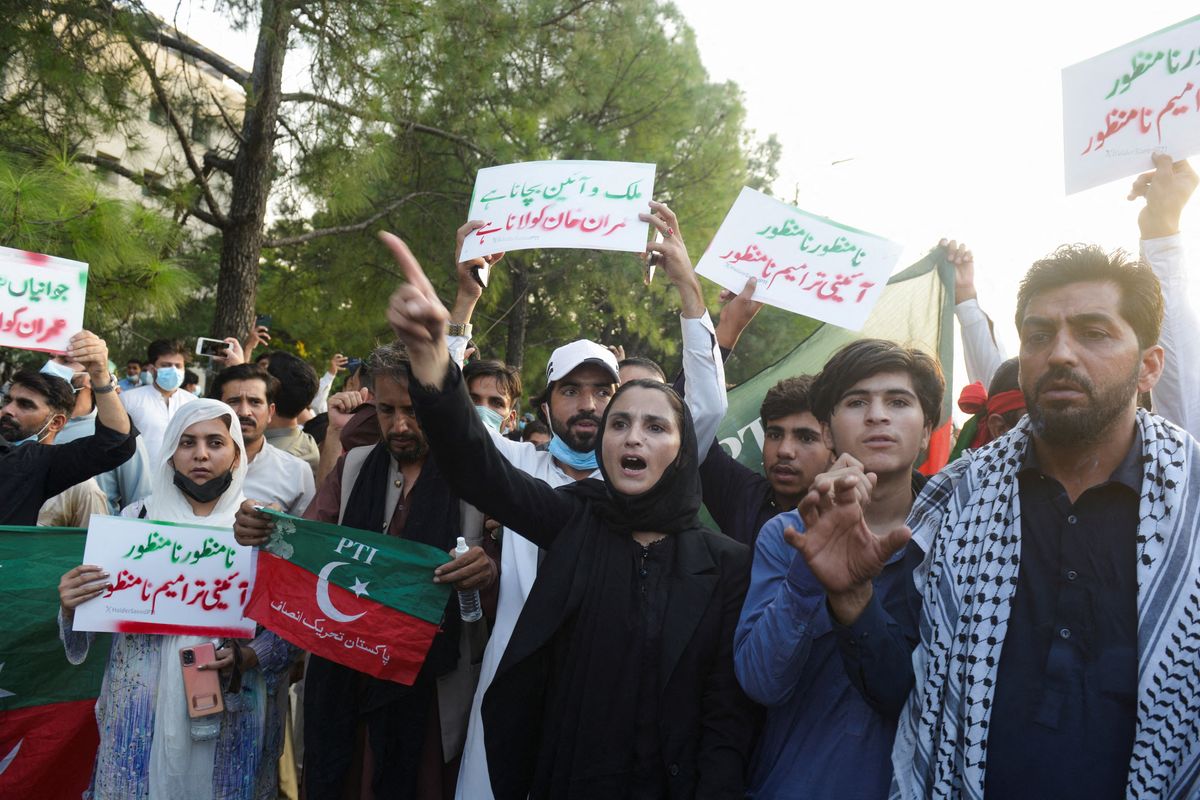Pakistan’s opposition party files contempt petition against election body over reserved seats case
PTI's Kanwal Shauzab seeks action against 'failure' to implement top court's July 12 ruling declaring party eligible for reserved seats

Aamir Abbasi
Editor, Islamabad
Aamir; a journalist with 15 years of experience, working in Newspaper, TV and Digital Media. Worked in Field, covered Big Legal Constitutional and Political Events in Pakistan since 2009 with Pakistan’s Top Media Organizations. Graduate of Quaid I Azam University Islamabad.

Supporters of jailed former Pakistani Prime Minister Imran Khan's party, the Pakistan Tehreek-e-Insaf (PTI), gather for an anti-government rally in Islamabad, Pakistan, October 4, 2024.
Reuters
Supreme Court had declared ECP's denial of PTI's reserved seats unconstitutional
Govt maintains apex court's ruling cannot be implement in light of amendments made to to Election Act, albeit after the July 12 ruling
National Assembly Speaker refuses to implement court's ruling, awaits ECP notice
The opposition Pakistan Tehreek-e-Insaf (PTI) filed a contempt of court petition in the Supreme Court on Monday against the Chief Election Commissioner and four other members of the Election Commission of Pakistan (ECP) for not implementing the court's decision on reserved seats for women and minorities.
The petition seeks immediate compliance with the court's ruling. It has been filed by PTI Women's Wing President Kanwal Shauzab, through lawyer Salman Akram Raja.
The PTI members have requested that contempt of court proceedings be initiated against them for their alleged failure to implement the court's ruling.
In a separate development, National Assembly (NA) Speaker Ayaz Sadiq once again clarified he would not act on the Supreme Court's decision, rather he would wait for the ECP's notification to that effect, characterizing the court's verdict as a "re-writing of the Constitution".
The outcome of this petition could have significant implications for the party and its legal strategy moving forward.
The reserved seats case
On July 12, 2024, a 13-member Supreme Court bench declared the ECP's decision to deny reserved seats to the PTI "null and void" and unconstitutional.
The majority verdict determined that 39 out of 80 MNAs were verified PTI candidates while giving the remaining 41 independents a 15-day window to submit notarized statements confirming their party affiliation. This ruling potentially gave the PTI a significant share of the 60 women's and 10 minority reserved seats in the National Assembly based on proportional representation.
The landmark verdict stated that PTI candidates who ran as independents or joined the Sunni Ittehad Council (SIC) after PTI was stripped of its "bat" symbol cannot be disqualified from receiving reserved seats, affirming that "PTI was and is a political party."
The court rejected the ECP's argument about the PTI missing the January 24 deadline for candidate submission, ordering the party to submit a fresh list.
Following the Supreme Court's decision, the government amended the Election Act 2017, specifically modifying sections 66 and 104 and adding section 104A. These amendments stipulated that independent candidates who join a political party after elections cannot be counted for calculating that party's share of reserved seats. This directly contradicted the Supreme Court's ruling and would prevent the PTI from receiving any reserved seats despite having the second-largest presence in parliament.
The Supreme Court, through an 8-member bench, issued two clarifications emphasizing that the amendments to the Election Act cannot retroactively affect its July 12 verdict. The court reasoned that since the amendments were made after their judgment, they could not be applied to a case that had already been decided.
The court explicitly stated that the ECP is bound to implement its decision "in letter and spirit" regardless of the subsequent legislative changes.
Despite these clear directives, the ECP has refused to implement the Supreme Court's verdict, citing the government's amendments to the Election Act as justification. This stance is supported by NA Speaker Ayaz Sadiq's recent statement that he would wait for ECP's notification rather than follow the court's clarifications.










Comments
See what people are discussing